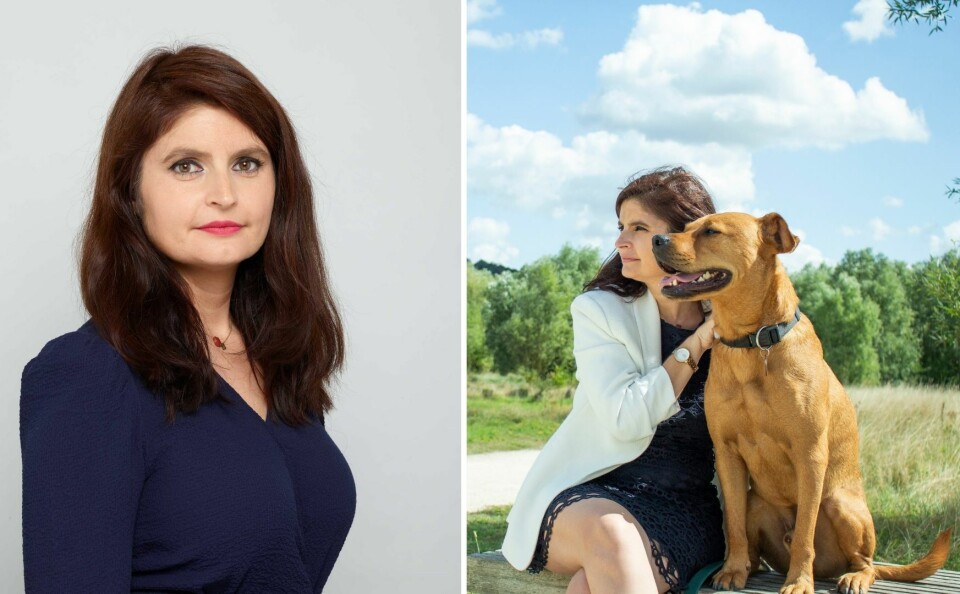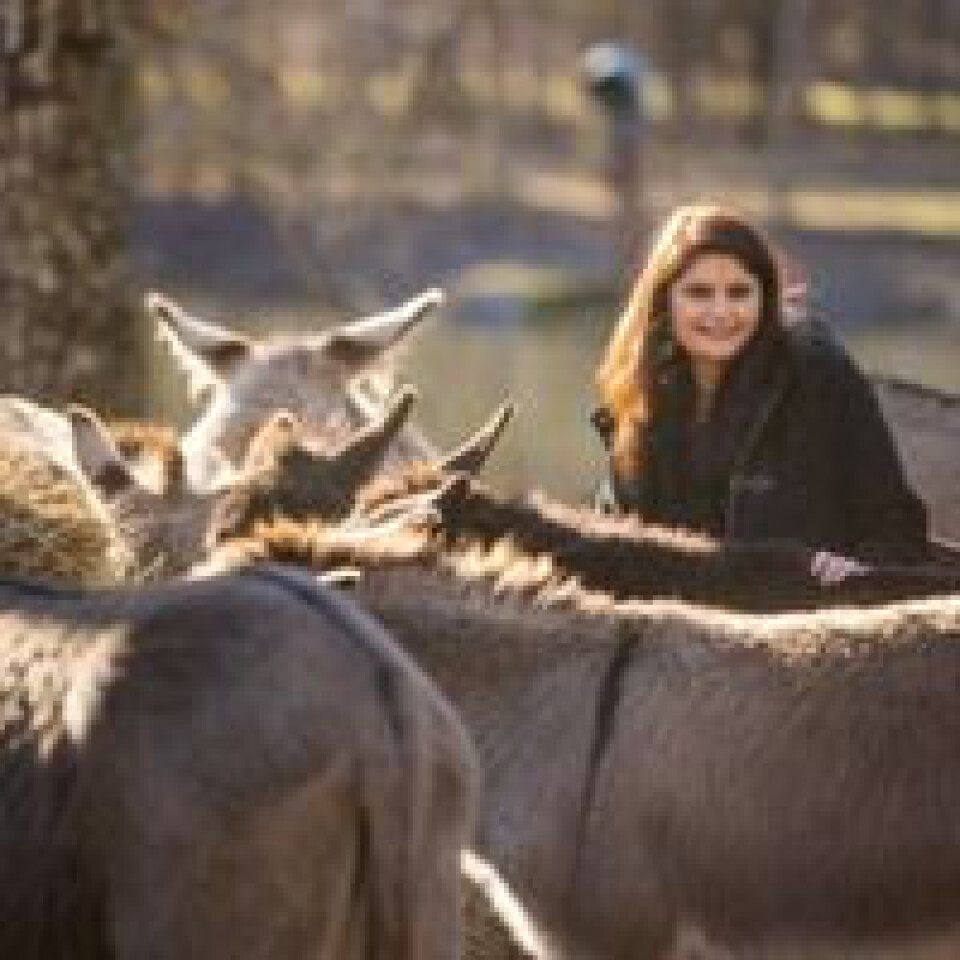-
French law offers long-term protection for garden wildlife
Owners in France can call on the law for help to ‘rewild’ their land. Here is how
-
French windfarm paused after 300 protected birds killed by blades
Plus how many windfarms are there in France?
-
What is the difference between chasse réservée and réserve de chasse in France?
The similar signs have quite opposite meanings
‘A long road ahead’: Parti Animaliste leader on French animal rights
Hélène Thouy discusses her presidential campaign and the barriers to improving animal welfare in France

The Connexion’s Théophile Larcher talks with politician Hélène Thouy about the results of her presidential campaign and the issues preventing the progression of animal rights in France
You did not meet the 500 signatures required to be eligible for a presidential candidacy, but do you think you’ve already achieved a great deal?
We knew it would be hard. We knew animal rights would not be solved in a two-month presidential campaign.
We also knew it could be a great opportunity to put the spotlight on animal welfare.
There is undeniable progress. We defended our cause as much as we could despite the constant agitation around the immigration issue with Eric Zemmour’s bid. We regret nothing.
We knew it would be tough, since presidential elections are typically restrictive for newcomers.
Read more: Animal rights candidate lacks support to stand in French election
Since parrainages (pledge to support a candidate) are public, a majority of mayors are pressured to remain silent. Seventy percent of mayors end with no parrainage as a result.
We suffered from that pressure. But I am already planning ahead and the Parti Animaliste will have several hundreds of candidates for the legislative elections. There is a long road ahead.
Is the hunting lobby responsible for an absence of support from mayors?
There is the hunting lobby on one side. The highest reservoir for parrainages comes from the mayors, around 80% of the total parrainage share.
Hunters still have a lot of power in rural territories although they represent a minority. They threaten retaliation. Mayors do not want to take any risk as a consequence.
But political parties played a role as well, since they demanded that their affiliated mayors vote for the party.
I had parrainage pledges that were never given after mayors were pressured by candidates who had already reached the threshold.
Mayors also refuse to give parrainages in case they lose their subsidies, which are often a huge chunk of the mairie’s budget.
What is yet to be done in order to advance animal rights?
Everything surrounding livestock animals is exempt from regulation, in other words the majority of the planet’s animals.
Three million animals are killed every day. This is why we want intensive livestock farming to end.
Not to mention hunted or aquatic animals. Wild animals need to be protected against abuse, just like pets do.

Photo: Ludovic Sueur
Ethics and educational courses need to be taught within schools from an early age to sensibilise young students so they will act responsibly.
This is part of an education aimed at respecting one another.
Many procedures already exist, but how they are applied by judges is problematic.
Lawyers have trouble convincing judges that they should sue animal abusers.
When they succeed, judges only enforce light sanctions, which should be more dissuasive.
A lot needs to be done.
You are a lawyer. Why don’t you keep fighting at a judicial level?
I tried to bring the fight to the institutions and judges, but neither fully grasped what needs to be done in animal welfare.
Any time I would bring the question forward to the judge, the laws were not even put up for discussion and therefore I could not get a vote on the issue.
It was especially obvious to me during the animal-rights referendum in 2020.
MPs were pressured, while a large majority of measures were favoured by the population, such as for the abolition of stag hunting or intensive farming.
Some of them have even had their committee room ransacked.
A minority wants to suppress the debate, despite there being a towering movement behind better animal welfare.
I created the Parti Animaliste to bring the issue to the people.
Is the hunting lobby responsible for this gap between public opinion and the hardships you faced when bringing it to law?
That is for sure.
If citizens had a voice in this, we would have moved forward quicker.
We would have already abolished corrida (bull-fighting), intensive farming, stag hunting and various other practices that appal many citizens, but that are shut down by hunting lobbies or food-processing lobbies.
Starting this fight also means a reform of our institutions is needed.
Yannick Jadot listed the end of intensive farming among his campaign proposals. Are you not afraid your ideas will be diluted by traditional parties?
We are glad that other political parties are beginning to take on the animal welfare issue, but we want to remain vigilant since most traditional parties take the issues only for electoral purposes rather than hoping to effect change.
I am glad that Mr Jadot wants to put an end to intensive farming, but you have to couple it with reducing the consumption of animal products, something Mr Jadot does not attempt to do.
Taking on the animal welfare issue only to gain voters does not help the cause.
That is why our party is still here.
If animal welfare was better integrated among other political parties, I would question my legitimacy for creating the Parti Animaliste, but for the time being that is not the case.
Does your party exist outside the classic right and left French party division lines?
We are part of the phenomenon, yes.
More and more people no longer align themselves with the right/left traditional division of political parties.
We have people from very different backgrounds at the Parti Animaliste who, although agreeing on animal welfare, do not agree on subjects such as the European Union or the economy for instance.
The right and left spectrum is an outdated vision of French politics.
It means institutional reforms must be taken in the years ahead.
Is the UK a source of inspiration regarding the animal welfare issue?
I want to say that they have a less ‘pathological’ relationship than us.
We have an irrational relationship with gastronomie, where it feels like we cannot eat properly if we do not consume meat three times a day.
This is something so deep-rooted in our culture that we tend to be contemptuous towards other forms of cooking, like meatless meals.
We have this ill-suited pride with our gastronomie but there is nothing to be proud of when we look at the atrocities that it generates.
British people seem more detached and open to other forms of cooking.
But shouldn’t we consider cultural heritage and traditions in France, like the corrida?
When you challenge concepts such as tradition, you are considered an enemy of the state for rejecting what is believed to be a part of French identity.
French people have built this artificial identity made of an accumulation of atrocities like foie gras or the corrida.
Read more: Foie gras label not possible if no gavage: French MP wants law change
French identity does not only restrict itself to gastronomie.
The Enlightenment philosophers produced things other than the poule au pot dish or force-feeding geese.
How did your childhood affect your values regarding animal welfare?
I grew up on a farm in the countryside in southern France.
My house faced a forest where I would regularly hear the sound of hunters’ gunshots.
I associated from an early age the animal killed at the farm with the one we had on our plates, mostly chickens.
My grandmother lived near an abattoir, where I would often hear the animals screaming. It did not sound to me like they wanted to be killed.
I had an emotional connection with animals very early on, which developed into an intellectual and rational cause when I grew up.
You have said that cities with abattoirs tend to be more violent than those without
At least that is what has been reported in studies.
There is a connection to be made between the violence we inflict on animals and the one we inflict on humans. There is some kind of habituation to violence, yes.
The Federal Bureau of Investigation (FBI) takes into consideration violence inflicted on animals when identifying potential marital violence.
Have you been confronted with such cases as a lawyer?
I work in the countryside as a lawyer with family-related and animal-rights issues.
I have heard about abused women afraid of their husbands, often hunters, because they bring their gun home. They felt that the gun was a symbol of intimidation.
I do see a link between an anxious environment and the presence of a gun at home.
Is violence in society mirrored by our cruelty towards animals?
It seems obvious for us, but we have come to the conclusion that it was not during the campaign.
We live in a society more in tune with animal cruelty, and I think it is important to show the connections with various forms of violence. It is the mirror of the consideration we have for each other.
Our comprehension of the world is clearly different if we have already interiorised this daily dose of violence, in other words eating animals and wearing products derived from animals, as normal, legitimate and almost mundane.
This is just a question of dosage.
We live in societies that prohibit violence toward human beings but we grow up with the omnipresence of violence.
When we begin to question its legitimacy, we create a more peaceful relationship with what surrounds us.
We would have had fewer wars if people who cared about animal rights had been in power.
How do you convince farmers and hunters that you understand where they’re coming from, when animals are often how they earn their living?
We want to show that we are not against farmers, but we rather want to work hand in hand to change the system. This fight is for the common good, and should concern everybody.
Regarding farmers, they are barely managing to earn a living, and so they are desperate.
Frequently they earn between €300 and €500 a month for 17 hours of work per day. Many see suicide as the only option.
Behind closed doors, they agree with us about intensive farming.
The problem is that most are bound by debt and cannot find a decent alternative way to earn a living.
Hunters practice for leisure and therefore have trouble understanding something that restricts their hobby.
But, like farmers, when you talk to them, they can see why society disapproves of certain practices.
The issue is on the table.
One hunter told me they will have trouble continuing to turn a blind eye for much longer.
They are aware their position is indefensible. It is only a matter of time before they yield.
Related articles
Why French government agreement marks historic day for animal welfare
Unknown party beat everybody in one French commune
Should foxes still be classed as ‘pests’ in France?
























